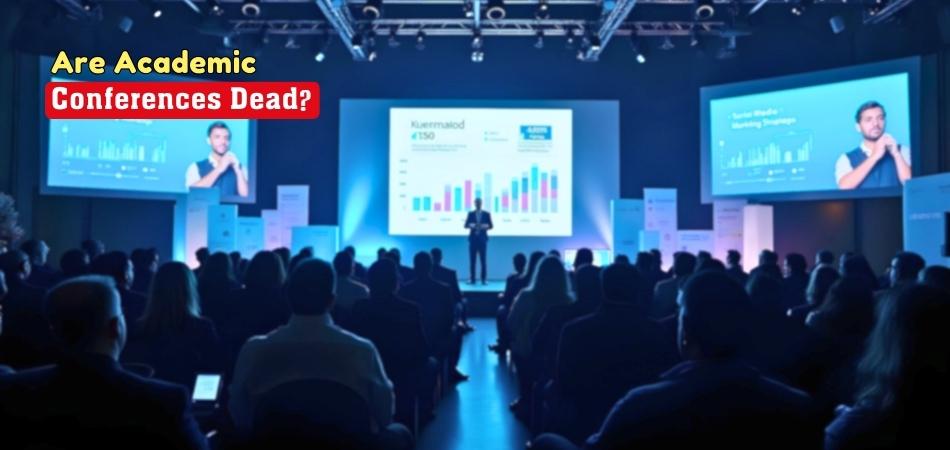Academic conferences are an important part of scholarly exchange, providing opportunities for researchers to present their work, collaborate, and stay updated on the latest developments in their fields. However, with the rise of digital tools and virtual platforms, many are asking, “Are academic conferences dead?”
No, academic conferences aren’t dead, but they’re evolving. Virtual and hybrid models are reshaping how these events are organized, making them more accessible, flexible, and global. These changes promote wider collaboration and keep conferences relevant in the digital age.
Our purpose in this article is to discuss the future of academic conferences and how they continue to play a significant role in the exchange of knowledge and research. For more information, please continue reading.
Are Academic Conferences Dead or Entering a New Era?
No, academic conferences aren’t dead, but they’re going through a transformation led by innovation. A variety of virtual and hybrid formats have broadened participation, allowing individuals from different geographical locations to participate without being restricted by geographical limitations. With this in mind, upcoming conferences now place a strong focus on accessibility, offering both in-person and online experiences to meet modern attendees’ needs.

In recent years, academic conferences have transformed to meet the changing needs of the global research community. The use of virtual platforms has made it possible for smooth knowledge exchange while preserving the personal connections necessary for collaborative progress. Attendees can now choose flexible participation options that align with their personal preferences and professional goals.
This new era ensures that academic conferences remain valuable and relevant in an increasingly globalized environment. By utilizing digital tools, networking opportunities have expanded here, and meaningful connections have been made across time zones and continents. As a vital space for sharing knowledge and building professional relationships, academic conferences are far from being forgotten.
Challenges Are Traditional Academic Conferences Facing
Traditional academic conferences have long been a source of knowledge sharing, yet they face significant challenges in the present day. With the rise of digital tools and shifting attendee expectations, the nature of these events is changing. Listed below are the most significant challenges that threaten the relevance of traditional academic conferences:
- High Costs and Limited Access: Organizing in-person events often requires significant financial resources, which makes them expensive for both attendees and organizers. This exclusivity limits participation, reducing global collaboration opportunities.
- Travel Barriers and Time Constraints: International travel requirements create logistical issues, particularly for researchers from developing countries. Additionally, packed schedules discourage participation, impacting conference attendance.
- Environmental Impact of Large Events: Traditional conferences contribute heavily to carbon emissions through travel and resource-intensive setups. This raises concerns among environmentally conscious attendees and institutions.
- Rigid Formats Reduce Engagement: Structured agendas often lack flexibility, restricting opportunities for interactive sessions. Attendees may feel less motivated to actively participate.
- Limited Networking Opportunities: In-person events can limit networking to specific times or locations, eliminating the possibility of broader, informal connections. Such limitations reduce long-term engagement.
- Exclusivity Over Inclusivity: Language barriers and regional restrictions discourage broader participation. As a result, academic discussions are excluded from diverse viewpoints.
- Technology Integration Is Often Insufficient: Many traditional conferences fail to utilize digital tools for live interaction. This limits dynamic collaboration and wider audience engagement.
- Outdated Communication Channels: Conference announcements often rely on traditional mediums, missing opportunities for digital outreach. This affects awareness among potential global participants.
- Difficulty Measuring Impact: Traditional conferences lack reliable tools to assess their academic and professional outcomes. As a result, institutions and funders may find it difficult to justify their participation.
- Reduced Appeal to Younger Researchers: Early-career professionals prefer tech-savvy, interactive formats that traditional conferences rarely provide. This creates a disconnect with the next generation of scholars.
How Are Virtual and Hybrid Models Changing the Academic Conference Prospects?
The virtual and hybrid conference models have transformed academic conferences in recent years. By using these formats, you can ensure accessibility and inclusivity. Combining digital tools with traditional elements, they provide new opportunities for academic engagement. The following is a detailed explanation:
Wider Reach and Accessibility
With virtual and hybrid models, participation is possible from anywhere, regardless of location or financial limitations. Researchers from different regions can now contribute and learn without travel restrictions. This increased accessibility promotes inclusivity, enabling minority groups to attend and present their work. It ensures academic discussion is more diverse and comprehensive than ever.
Flexible Participation Options
Participants can now choose between attending in person or online, based on their preferences or circumstances. Flexibility lets you handle different time zones, making schedules more convenient for global audiences. In recorded sessions, attendees can revisit key talks or catch up on content they missed. These options enhance the overall conference experience and engagement levels.
Cost-Effective Solutions for Organizers and Attendees
Hybrid and virtual models significantly reduce costs by eliminating expensive venues and travel expenses. Organizers save on logistical arrangements while ensuring a high-quality experience. Attendees, especially from developing regions, benefit from lower participation fees. This affordability makes academic conferences accessible to a wider range of scholars.
Enhanced Use of Technology
Interactive tools, like live polls and Q&A sessions, encourage active participation during virtual events. Through networking platforms, participants can connect directly no matter where they are located. By using advanced analytics, event organizers will be able to improve the quality of future events. These technologies help researchers identify a high-quality academic conference by offering detailed event information and participation metrics.
Environmental Benefits of Reduced Travel
In virtual and hybrid formats, carbon emissions associated with travel and large physical setups are minimized. This shift aligns academic conferences with sustainability goals and environmental consciousness. A growing number of institutions and attendees are aiming to reduce their carbon footprint with eco-friendly practices. While maintaining their impact, conferences can contribute to global sustainability initiatives.
Future-Proofing Academic Events
Hybrid models offer resilience by ensuring continuity even during unexpected disruptions, like pandemics or natural disasters. They create an adaptable framework that evolves with changing global trends. This approach prepares academic conferences to succeed in a fast-paced, digitally-driven environment. This ensures their relevance for the near future.
Benefits of Emerging Academic Conference Formats
Academic conference formats are evolving, opening up new opportunities for attendees, organizers, and researchers. Beyond accessibility and flexibility, these innovations bring unique advantages that were previously unexplored. Here are some benefits that will form the future of academic conferences:
- Focused and Specialized Tracks: New formats feature niche tracks customized to attendees’ interests, enhancing relevance. This allows participants to focus on their specific interests.
- Real-Time Collaboration Across Disciplines: Interactive sessions encourage instant collaboration between scholars from multiple fields. This cross-disciplinary approach leads to innovative ideas and new solutions.
- Better Work-Life Balance for Participants: Flexible conference schedules help researchers balance professional engagement with personal commitments. This creates a healthier, stress-free participation experience.
- Integration of AI for Smarter Insights: AI tools assist in summarizing sessions and identifying key takeaways. This technology enables attendees to extract insights more efficiently.
- Community Building Beyond the Event: Online forums and digital platforms enable long-term engagement among participants. A conference’s networking extends long after its duration.
- Opportunities for Early-Career Researchers: New formats provide dedicated spaces for emerging scholars to showcase their work. These opportunities boost confidence and visibility within the academic community.
- Focus on Wellness and Accessibility: A thoughtful schedule and accessible features like subtitles or translations allow diverse attendees to feel comfortable. This prioritization contributes to the overall conference experience.
How to Maximize Value from Modern Academic Conferences?
Modern academic conferences offer excellent opportunities for learning, networking, and collaboration. To make the most of these events, preparation and active participation are key. Here are effective strategies to maximize the value of your conference experience.
Prepare Before the Conference
Research the schedule and identify sessions that align with your interests and goals. Familiarize yourself with the speakers and their work for better insights. Prepare questions in advance to engage meaningfully during discussions. Ensure you register early to secure your spot and access important updates.
Engage Actively During Sessions
Participate in live polls, Q&A sessions, and interactive workshops to deepen your understanding. Take detailed notes to retain crucial information for future reference. Introduce yourself to speakers or attendees to build valuable academic connections. Stay focused during sessions to capture key takeaways effectively.
Utilize Networking Opportunities
Attend networking events and informal meetups to connect with like-minded professionals and experts. Start conversations by sharing your research interests or career goals. Stay social at an academic conference to create lasting professional relationships. Use online platforms to connect with attendees you couldn’t meet in person.
Use Conference Resources
Access recordings of sessions to revisit key insights you may have missed. Download available materials, such as slides or reports, for later use. Explore sponsor or exhibitor booths to learn about tools and resources. Keep a digital folder to organize conference materials for future reference.
Follow Up After the Event
Send personalized messages to new contacts, expressing gratitude and interest in future collaboration. Apply insights from the sessions to improve your academic or professional work. Share key takeaways with your colleagues to expand the impact of your participation. Stay involved with the community by engaging on forums or social media.
Common Questions and Answers
Academic conferences are an essential part of knowledge sharing, but their formats and relevance are evolving. Virtual and hybrid models have taken over the field, raising questions about their future. Below are FAQs to address common concerns and provide clarity.
What Are Hybrid Conferences, and How Do They Work?
Hybrid conferences combine in-person and online elements, giving attendees flexibility to participate in their preferred format. These conferences include live-streamed sessions, virtual networking spaces, and in-person workshops, creating an inclusive and dynamic academic environment.
Are In-Person Conferences Still Relevant Today?
In-person conferences remain essential for developing face-to-face interactions and building strong professional networks. While virtual alternatives are practical, the value of physical presence and immersive engagement keeps traditional formats relevant for many participants.
Can Virtual Platforms Facilitate Meaningful Networking?
Virtual platforms use tools like breakout rooms, chat functions, and networking apps to facilitate connections. These technologies replicate in-person interactions, allowing attendees to meet, collaborate, and maintain professional relationships beyond the event.
What Makes a Conference High-Quality?
A high-quality conference offers relevant content, expert speakers, interactive sessions, and networking opportunities. It ensures inclusivity, uses advanced technology, and provides valuable takeaways for attendees’ academic or professional growth.
What Skills Can Attendees Develop at Conferences?
Conferences help attendees develop communication, networking, and presentation skills. Participants also gain critical insights into emerging trends, enhancing their ability to stay competitive in their fields.
Final Thoughts
Academic conferences have experienced significant transformations to remain relevant in a society that is constantly evolving. Addressing the question, “Are academic conferences dead?” it’s clear they are not but are adapting to meet modern needs. Providing access to virtual and hybrid formats has enabled more people to participate, as well as reduced the cost of travel and promoted inclusivity, ensuring global collaboration.
The advancement of technology has enhanced engagement, while eco-friendly practices are aligned with sustainability goals. Despite the challenges faced by traditional formats, academic conferences continue to be vital spaces for knowledge exchange and networking.
With the rise of digital technology, these events not only survive, but thrive as well. Their evolution ensures they remain an essential platform for researchers and professionals to share ideas, build connections, and drive academic progress globally.







